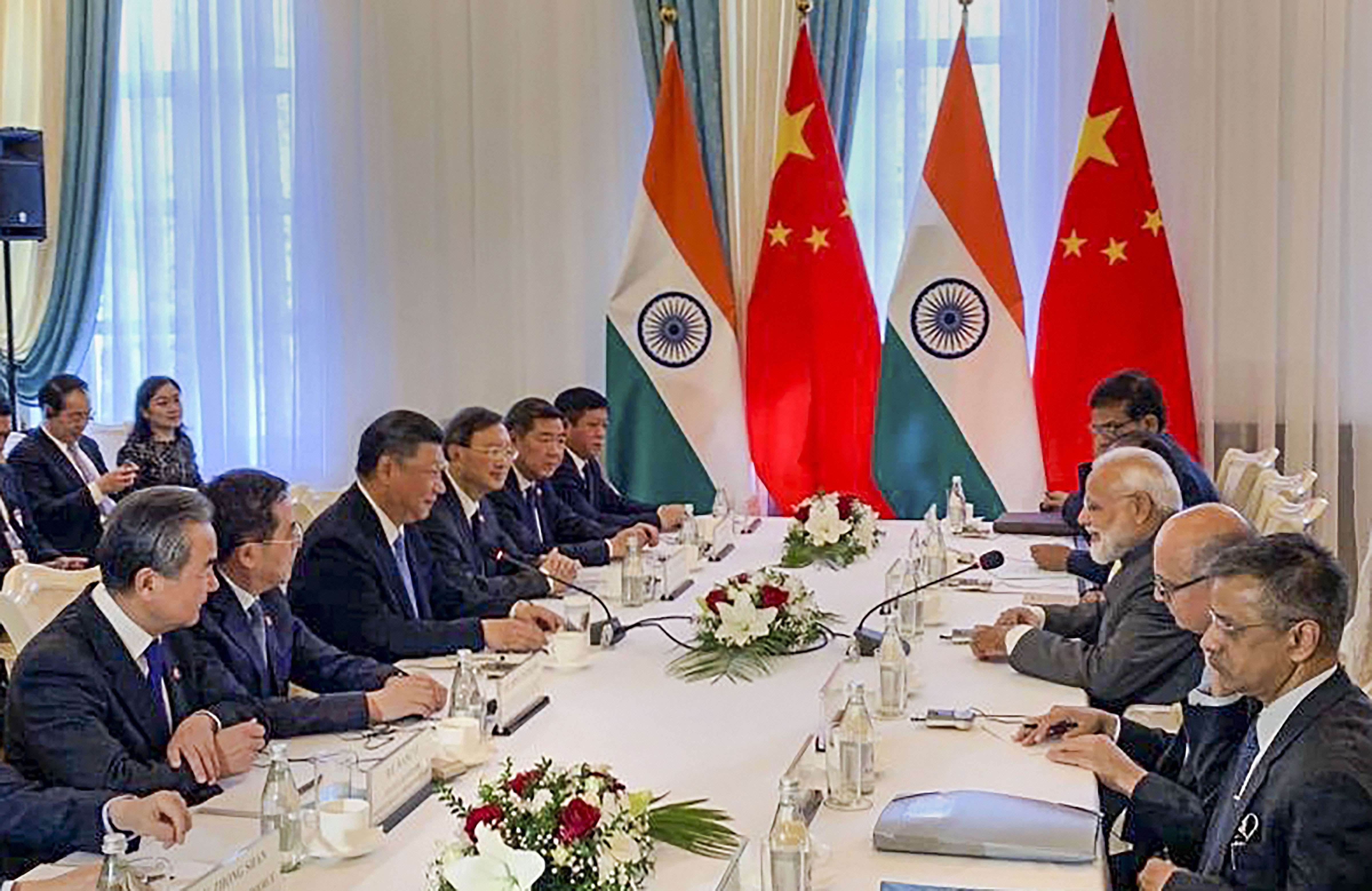

Political will needed to solve border dispute with China

Prime Minister Narendra Modi and Chinese President Xi Jinping, who recently met at the Shanghai Cooperation Organization summit at Bishek, have agreed to expedite dialogue on the India-China border dispute to find a “fair” solution to the almost intractable problem. Considering China is India’s largest trade partner since 2013 the two neighbours already enjoy economic engagement which unites nations. It is only therefore logical that the two sides should settle their border dispute which is a colonial legacy.
Unsettled borders between India and China only provide scope for military forces deployed across either side of the Line of Actual Control to turn trigger happy by default. The Indian Army deploys 11 mountain divisions, around 1.2 lakh troops along its border with China, more as an insurance to tackle the Chinese threat given the legacy of the 1962 Himalayan humiliation when the Indian Army suffered a serious setback. Diplomacy is the only instrument of foreign policy that could ensure against potential hostile military confrontations.
The border dispute with China is quite different from the territorial problems with Pakistan. Indian and Chinese soldiers do not clash in the manner that Indian and Pakistani soldiers do that end in beheadings and violence. The India-China border is not marked by blood unlike the India-Pakistan border.
China seeks to stake claim to disputed territory through the physical presence of its troops on ground. All along, the two neighbours have sought to assert their presence through patrols, which periodically pass through these disputed borders, and leave tell-tale signs such as food packets, cigarette butts or other items, to stake their territorial claims. Earlier the two sides never attempted to maintain a semi-permanent presence on these territories, such as pitching tents. However after the Chinese started the practice — the Indian troops too have pitched tents that have resulted in a face-off between the two sides.
Therefore, both sides decided to embark on military diplomacy as an ideal medium since the early 1990s. This led to contacts between military commanders at various levels which appeared to prove useful to ensure peace and tranquility along the border. The military medium assumes importance because misunderstandings at their level have the potential to snowball into politico-diplomatic crises from time to time. The brinkmanship between the Indian and Chinese armies for 73 days at Doklam plateau in 2017 is a testimony. It was worrisome that such a prolonged standoff may have led to a ‘hot’ or shooting war between the two sides.
Apart from India, China settled its boundaries with all its other neighbours. Despite the border dispute that developed during 1954 New Delhi and Beijing enjoyed cordial relations with each other. The developments in Tibet the Khampa revolt in 1959, the flight of the Dalai Lama along with the exodus of Tibetan refugees to India resulted in tensions that culminated with the India-China war in 1962. This implies that the dispute between the two countries evolved more due to political than territorial considerations.
The India-China relationship is conditioned by the international political order, the regional security environment and domestic politics. Today China has emerged as a powerful country that has the potential to challenge US leadership in the post-Cold War period with its mighty military and enormous economic capability. This is evident from the fact that China established a naval base at Djibouti, a small state located on the Horn of Africa in 2017 and prepares to induct its third aircraft carrier into operational service in the near future.
India’s Cold War alliance with the former Soviet Union to counter China politically and militarily ceased with the collapse of the Soviet juggernaut in 1991. Thereafter India has over almost three decades chosen to cultivate close ties with the US in political, military and economic terms. During the Cold War era China choose to cultivate connections with Pakistan despite its proximity to the US. Clearly China cultivated ties with Pakistan and India’s other smaller neighbours only to checkmate the rise of India as a regional power in South Asia. For instance, the Sino-Pakistan agreement on satellite technology signed with Pakistan in April 2019, proposal for a trans-Himalayan railway line with Nepal or FTA with Maldives in 2017 and over involvement in infrastructure development in Sri Lanka. Besides, China is the biggest arms supplier to Bangladesh. Beijing’s main interest is Bangladesh’s 160 million strong market.
India’s relations with several smaller Southeast Asian nations namely Singapore, Malaysia, Taiwan, Thailand and Vietnam which also perceive a level of military threat from China shapes the regional strategic environment. India’s ties with these nations are political-military in character and in tune with the Act East Policy that Prime Minister Modi articulated in November 2014.
India and China should realize that it is time to progress from the anachronistic Clausewitzean dictum that war is an extension of politics to the more enlightened thinking of the “American Clausewitz” Bernard Brodie who averred that the military instrument should aim to avert war rather than wage it. Clearly at this point in time the way forward is a political formula crafted at the highest levels of government. The Special Representatives of India and China designated to dialogue on the border dispute have to put their heads together backed up by their respective foreign office bureaucracies. The political dividend that PM Modi would obtain from a solution to the vexed border dispute would be phenomenal domestically and more importantly shed a British colonial legacy.
(The writer teaches International Relations and Strategic Studies at the Christ Deemed to be University, Bengaluru)


